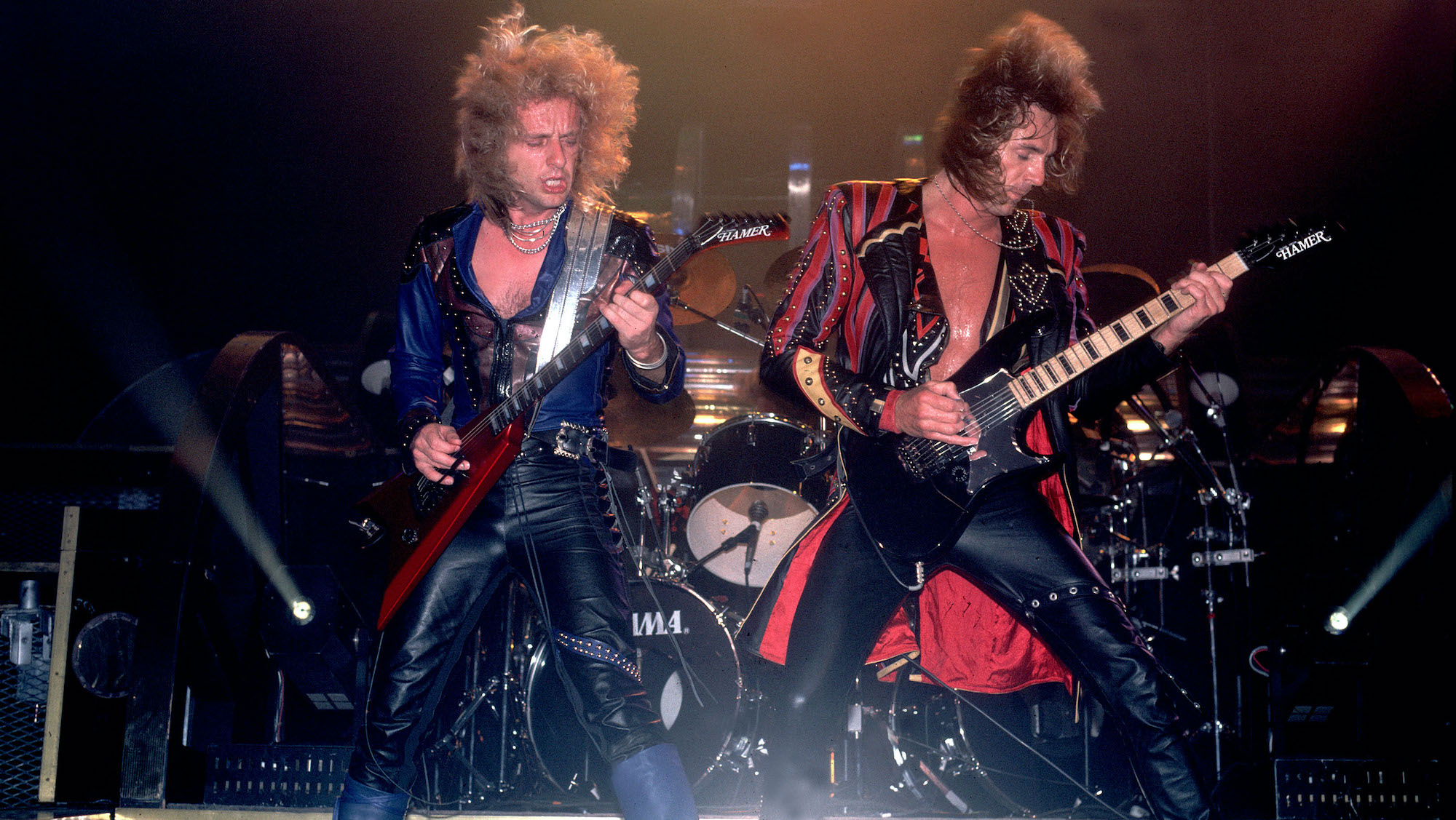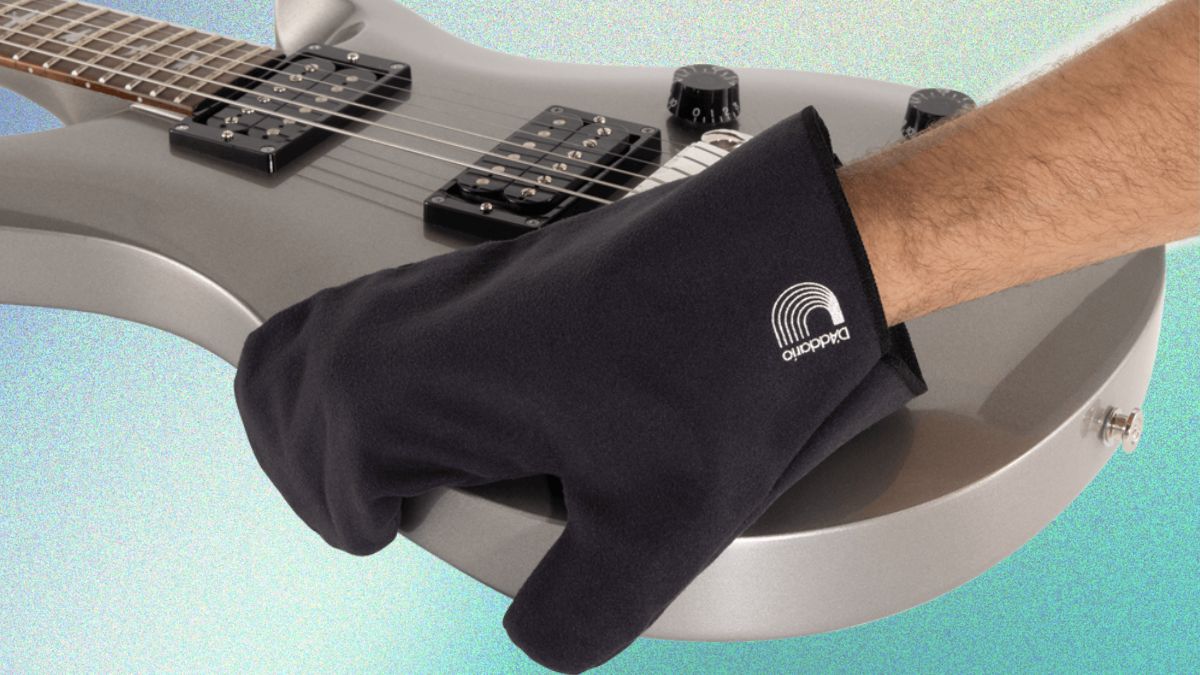K.K. Downing and Glenn Tipton dissect 17 of Judas Priest's loudest, fastest and toughest tracks
In this classic GW interview, one of rock's all-time greatest guitar duos discuss Judas Priest's greatest hits, including the song they see as the band's Stairway to Heaven

All the latest guitar news, interviews, lessons, reviews, deals and more, direct to your inbox!
You are now subscribed
Your newsletter sign-up was successful
In 1993, Guitar World sat down with Judas Priest guitarists Glenn Tipton and K.K. Downing to discuss some of the finest moments from the Priest catalog. The following “Prime Cuts” interview was never published in the magazine.
Victim of Changes – Sad Wings of Destiny (1976)
K.K. Downing: "We didn't put it on our first album [Rocka Rolla] because we felt it didn't fit in with the rest of those songs. It's one of those songs that really has a lot of variation and mood swings within the same song. It's got something for everybody."
Sinner – Sin After Sin (1977)
Glenn Tipton: "Oh, yes – a very good song. It's one of our early classics. To me, it rates right up there with Victim of Changes. It was one of the first long and involved songs that we did, but it never gets tedious. Sinner is a good example of how Judas Priest use light and shade – and that's what Judas Priest is all about. Even the band's name is a contradiction in terms, and a lot of our music is the same way."
Exciter – Stained Class (1978)
Downing: "I was particularly pleased with the guitar sound on this song, especially in my solo. Exciter really demonstrates what kind of a player I was back in the early days; very loose and ad-lib, not as rigid as I am today. Every solo on that album was spontaneous – I just went into the studio and played what came to me. My guitar was a '61 Stratocaster."
Beyond the Realms of Death – Stained Class (1978)
Downing: "In a way, that song is Judas Priest's Stairway to Heaven. As far as I'm concerned, it's a key song in the Priest repertoire, and one that could never be dropped from our live set. It's another song that demonstrates our use of light and shade."
Delivering the Goods – Hell Bent for Leather (1978)
Tipton: "I think it's better than Skid Row's version. Enough said. [laughs] Seriously, though, Delivering the Goods is a good Priest classic. It's one of those songs where, in the lead break, I had the volume control on both the bass and treble pickups turned way up, and I used the switch to produce some kind of weird effect – and this was in the days before you could buy the effect in a shop.
"The title Delivering the Goods is also a bit of a statement about Judas Priest and how we approach things. But it's not a real powerful heavy metal song – it's more like metal/rock."
All the latest guitar news, interviews, lessons, reviews, deals and more, direct to your inbox!
The Rage – British Steel (1980)
Downing: "That's a bit of a different song for Judas Priest. It has an almost reggae feel to it. It incorporates the light and shade aspect that a lot of our other songs have, but in a somewhat different way.
"It reminds me a lot of the Scorpions song, Loving You Sunday Morning. I played all of the solos on The Rage, and they show how I was learning to play more with feeling than frenzy.
"Those solos were more along the lines of something Robin Trower might have done. They're also a bit more bluesy than my normal solos, and that's probably a trait a picked up from Glenn; he was the more blues-oriented player in our early days."
Metal Gods – British Steel (1980)
Tipton: "I think if you ask most people what Judas Priest means to them, they'll probably say Metal Gods. It has that magic tempo where it just locks in. It says it all, really."
Heading Out to the Highway – Point of Entry (1981)
Tipton: "That was a very American-sounding track. Priest always remained a very British-sounding metal band, which I think was our appeal to American audiences. But Heading out to the Highway was one point where we crossed over.
"I mean, in England, you wouldn't say you went down the highway; you'd say you went down the road! It speaks of the freedom of the American highways – that Harley-Davidson approach."
Bloodstone – Screaming for Vengeance (1982)
Tipton: "One of my all-time favorite tracks. It's a very heavy track, but that's more of a mood thing than just straight power. Bloodstone says it all about Judas Priest."
Screaming for Vengeance – Screaming for Vengeance (1982)
Tipton: "That song, as well as Ram It Down, qualify as two of the fastest songs we've ever done. Playing Screaming... on stage with Judas Priest creates a feeling that some musicians would thrive on, and some musicians would hate – but, for me, it's an experience not to be missed. Screaming for Vengeance is also the band's best-selling album to date."
The Hellion/Electric Eye – Screaming for Vengeance (1982)
Downing: "When we started touring after the Screaming for Vengeance album, we opened our set with that song – so we figured it would make a good opening track for this compilation [Metal Works '73–'93].
"Electric Eye was one of our fantasy/science fiction songs that could be reality; it discusses the Big Brother concept of us all being watched. We like to create images through our music that people can see in their minds, and Electric Eye is a good example of that."
Freewheel Burning – Defenders of the Faith (1984)
Downing: "Oh, that's a killer song; I love playing it. God, that song is ten years old now, and it's still one of my favorites. There's a few neat guitar tricks in it, especially the skidding sounds."
Eat Me Alive – Defenders of the Faith (1984)
Tipton: "Ah, very good lyrics. [laughs] And it's not about oral sex! Believe it or not, I knew Eat Me Alive would be brought up in the court case. People always find some way to use that song as an example. But a great song, nevertheless. It has a real good beat to it, it comes in very strong and the big, grinding ending is also very effective."
Turbo Lover – Turbo (1986)
Tipton: "We got condemned a bit for that song. A lot of people thought it was our attempt at sounding commercial, when that really wasn't the case at all. I remember when we played some of the songs from that album live, like Locked In or Turbo Lover, and as soon as I cranked up the old synth-guitar, the crowd went berserk.
"I think the album was very mis-judged because, if you saw us play those songs live, there was no way you could call them lightweight."
Ram It Down – Ram It Down (1988)
Downing: "Man, what a song. It's a lot like Freewheel Burning, in that it's very fast and energetic. It features some serious playing from Glenn and I. We like to push ourselves to the limit in the studio – some of the rhythm parts in that song are just absolutely scary. Doing that song in the middle of a live set will just annihilate an audience."
Night Crawler – Painkiller (1990)
Downing: "We were very happy with that composition. Nightcrawler is like a mini-movie. The music stemmed from the lyrical idea of this 'thing' or beast terrorizing a city, and the music has a crawling feeling, just like an animal. We think it'll become one of our most popular and in-demand songs in the future."
A Touch of Evil – Painkiller (1990)
Tipton: "We wrote A Touch Of Evil in the studio, and the idea for it came from something [producer] Chris Tsangarides came up with. It emerged as a very powerful track, even if it was a little out of character for Judas Priest.
"We've never played songs that came from other people's ideas, and you can hear it when you listen to A Touch of Evil – you know there's someone else in there. But it's still a very good song, and I always love playing it on stage.
"I really enjoy the lead break in A Touch of Evil. Without being greedily busy, it has a lot of good licks in it and a lot of melody – and I think that's the key to a good lead break. You have to be patient and not try to put in every blistering lick that you know. The secret to being a good lead player is knowing exactly what the song needs – and doesn't need.
"If you listen to the guitar work on Painkiller, it definitely doesn't sound like two guitarists who've been playing for over 20 years trying to survive in today's guitar world. We're leaders – not followers."
As a teenager, Jeff Kitts began his career in the mid ’80s as editor of an underground heavy metal fanzine in the bedroom of his parents’ house. From there he went on to write for countless rock and metal magazines around the world – including Circus, Hit Parader, Metal Maniacs, Rock Power and others – and in 1992 began working as an assistant editor at Guitar World. During his 27 years at Guitar World, Jeff served in multiple editorial capacities, including managing editor and executive editor before finally departing as editorial director in 2018. Jeff has authored several books and continues to write for Guitar World and other publications and teaches English full time in New Jersey. His first (and still favorite) guitar was a black Ibanez RG550.

